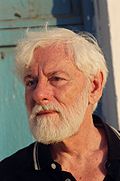Compared to him, his successors in the Prime Minister's office were second rate. Not to mention the present occupant, who is a dwarf.
It was Ben-Gurion who took the decision to declare the foundation of the state at that particular moment, when the last British occupier had left and four neighboring Arab armies were about to enter the country. His colleagues were afraid of the decision and had to be pushed by him.
Frankly, I don't think that this decision was so momentous. If the declaration had been deferred for some months, it would have made no real difference. After we had won the war, though with very heavy casualties, we could have declared the state at any time.
While the documentary is mostly accurate, there are some mistakes. For example, it shows the masses of Tel Avivis cheering in the streets upon the declaration. That is a falsification, though it has been repeated so often that Drucker can be excused for believing it. In fact, the masses cheered in November 1947, when the United Nations decided upon the partition of Palestine into an Arab state and a Jewish state (and a separate unit in Jerusalem).
When the Jewish state was officially founded on May 14, and Ben-Gurion made that speech, the streets were empty. The young were in the army, their elders were too anxious to cheer.
In that war, some 6,300 of us were killed -- out of a total Jewish population of 630,000. The equivalent of three million US citizens today. Many more were wounded (including poor me). Losses on the Arab side were even higher in absolute terms.
BEN-GURION'S AFFECTATIONS were many and colorful. He liked to present himself as a great philosopher, and the documentary shows him receiving many hundreds of books, paid for by a rich British Jew -- which would be a criminal offense under current Israeli law.
Be-Ge (as we called him) interfered in the conduct of the war, some of his erroneous decisions cost many lives. He also changed the character of the army in ways that we soldiers resented very much.
But all his good and bad decisions were negligible compared to his real historic role: his decision to turn Israel into a bulwark against the rising Arab world.
Of course, the Zionist movement was from the beginning a conscious part of European colonialism. In his book, "Der Judenstaat," the founder, Theodor Herzl, already promised that the state would be "a part of the wall of European civilization against Asiatic barbarism."
But it was Ben-Gurion who turned this vague promise into fact from the first day of Israel. According to his first biographer, he detested the Arabs and Arab culture from his first day in Palestine, suppressed the Arab minority in Israel and refused to draw Israel's borders.
The underlying reason was and is of course, that Zionism from the beginning wanted to dispossess the Arabs from their land in order to create there a new Jewish nation. This was never admitted, but was clear from the beginning.
All Ben-Gurion's successors, up to the present occupant of the office, followed this line. Even on its 70th birthday, Israel recognizes no official borders. Though we have official peace agreements with two Arab states (Egypt and Jordan) and unofficial cooperation with several more, we are hated by hundreds of millions of Arabs and a billion Muslims. And, even more important: we are at war with the entire Palestinian people. That is the real legacy of Ben-Gurion.
I AM not quite objective on this subject. I, too, was at war with Ben-Gurion.
The longer his reign lasted, the more autocratic he became. Altogether, from his assumption of power in the pre-state Zionist movement, he was the supreme leader for 30 consecutive years. No human being can be in power for so long without becoming a bit deranged.
I became the owner and editor-in-chief of a news magazine soon after the war, and began to criticize him sharply: his increasingly dictatorial manner, his colonialist treatment of the Palestinians, his anti-peace policy, his reactionary socio-economic policy and the corruption of many of his followers.
(Note: You can view every article as one long page if you sign up as an Advocate Member, or higher).





